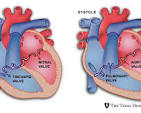Cardiac Valve Replacement: Understanding the Procedure and Recovery
Cardiac valve replacement is a surgical procedure that involves replacing a damaged or diseased heart valve with a mechanical or biological valve. This procedure is commonly performed to restore proper functioning of the heart and improve overall cardiovascular health.
The Procedure
During cardiac valve replacement surgery, the patient is placed under general anaesthesia to ensure they are unconscious and pain-free throughout the procedure. The surgeon makes an incision in the chest to access the heart and locate the damaged valve. The old valve is then carefully removed and replaced with a new prosthetic valve.
The new valve can be either mechanical, made of durable materials like titanium or carbon, or biological, made from animal tissue. The choice of valve depends on various factors such as age, lifestyle, and overall health of the patient.
Recovery
After cardiac valve replacement surgery, patients are closely monitored in the intensive care unit (ICU) for a period of time to ensure proper recovery. Patients may experience some pain or discomfort at the incision site, which can be managed with medication.
Physical therapy and rehabilitation are essential components of recovery after cardiac valve replacement surgery. Patients are encouraged to gradually increase physical activity under the guidance of healthcare professionals to regain strength and mobility.
Potential Risks
While cardiac valve replacement is generally considered safe, like any surgical procedure, it carries certain risks. These may include infection, bleeding, blood clots, or complications related to anaesthesia. It is important for patients to discuss these risks with their healthcare provider before undergoing surgery.
Conclusion
Cardiac valve replacement is a life-saving procedure that can significantly improve quality of life for individuals with heart valve disease. By understanding the procedure and following post-operative care instructions diligently, patients can achieve successful outcomes and enjoy better cardiovascular health in the long term.
Key Questions Answered: Understanding Cardiac Valve Replacement Surgery
- How serious is heart valve replacement surgery?
- Can a heart valve be replaced without open heart surgery?
- How serious is a heart valve replacement?
- What is the recovery time for a heart valve replacement?
- Can I live a normal life after heart valve replacement?
How serious is heart valve replacement surgery?
Heart valve replacement surgery is a serious procedure that is typically recommended for individuals with significant heart valve disease. While the surgery carries risks, including those associated with any major operation, advancements in medical technology and surgical techniques have significantly improved outcomes. The seriousness of heart valve replacement surgery underscores the importance of thorough pre-operative evaluations, discussions with healthcare providers, and adherence to post-operative care instructions to ensure the best possible results. Patients should consult with their medical team to fully understand the risks and benefits specific to their individual case before proceeding with the surgery.
Can a heart valve be replaced without open heart surgery?
The question of whether a heart valve can be replaced without open heart surgery is a common one among individuals seeking treatment for heart valve disease. While traditional cardiac valve replacement surgery typically involves open-heart procedures, advancements in medical technology have led to minimally invasive techniques that may offer alternatives for some patients. Transcatheter aortic valve replacement (TAVR) is one such minimally invasive procedure that allows for the replacement of the aortic valve through a catheter inserted into an artery, often avoiding the need for open-heart surgery. However, the suitability of this approach depends on individual factors such as the type and severity of the valve disease, overall health status, and anatomical considerations, which should be carefully evaluated by a healthcare provider to determine the most appropriate treatment option.
How serious is a heart valve replacement?
A heart valve replacement is a serious surgical procedure that is typically recommended for individuals with significant heart valve disease. While the surgery itself carries risks common to any major operation, such as infection or bleeding, the potential benefits of restoring proper heart function and improving overall cardiovascular health are substantial. It is crucial for patients to discuss the specifics of their condition with their healthcare provider to fully understand the seriousness of a heart valve replacement in their individual case and make informed decisions regarding their treatment options.
What is the recovery time for a heart valve replacement?
The recovery time for a heart valve replacement surgery can vary depending on individual factors such as the type of valve replaced, overall health of the patient, and any complications that may arise during or after the procedure. In general, patients can expect to spend a few days in the hospital post-surgery for monitoring and initial recovery. Full recovery from cardiac valve replacement typically takes several weeks to months, during which patients will gradually regain strength and stamina through guided rehabilitation and follow-up care. It is important for patients to follow their healthcare provider’s instructions diligently to ensure a smooth recovery process and optimal long-term outcomes.
Can I live a normal life after heart valve replacement?
After undergoing heart valve replacement surgery, many patients wonder if they can resume a normal life. The good news is that with proper care and adherence to post-operative guidelines, most individuals can indeed lead a fulfilling and active life following the procedure. While some adjustments may be necessary, such as regular follow-up appointments, medication management, and lifestyle modifications, many patients go on to enjoy improved heart function and overall well-being. It is important for patients to communicate openly with their healthcare team and follow their recommendations to ensure the best possible outcome and quality of life after heart valve replacement.

